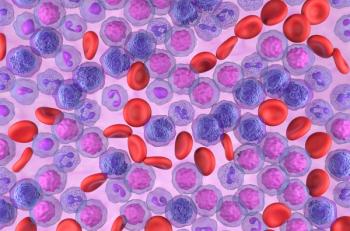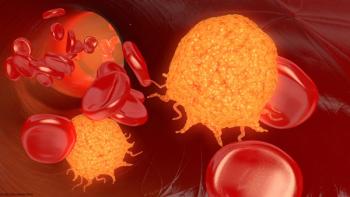
Data from the BRUIN-CLL-313 study may support pirtobrutinib as a new potential standard of care for those with untreated CLL or SLL.

Your AI-Trained Oncology Knowledge Connection!


Data from the BRUIN-CLL-313 study may support pirtobrutinib as a new potential standard of care for those with untreated CLL or SLL.

A total of 45% of patients with B-cell acute lymphoblastic leukemia experienced cytokine release syndrome while receiving treatment with MK-1045, of which 3% experienced grade 3 events.

The latest advancements in bispecific antibodies and antibody-drug conjugates continue to improve the personalized treatment of advanced non-small cell lung cancer.

The primary end point of GI overall response rate was met with MaaT013 for GI-aGVHD.

Across different studies, the highest incidence of left ventricular ejection fraction decrease was seen with trastuzumab/pertuzumab plus chemotherapy.

Data from a phase 1/2 trial support sonrotoclax as a promising treatment option in previously treated relapsed/refractory mantle cell lymphoma.

Across 20 patients with treatment-naive NSCLC enrolled in the eNRGy trial who received zenocutuzumab, the ORR was 35%, with a median DOR of 17.1 months.

In the amivantamab/lazertinib arm, the median OS in the Asian population was not reached vs 38.4 months in the osimertinib arm for patients with EGFR-mutated NSCLC.

Among patients with NPM1-mutated and KMT2A-rearranged disease, respectively, the ORR was 65% and 41% in the phase 1 KOMET-007 trial.

The FDA approved pirtobrutinib as a treatment for patients with CLL/SLL who received prior BTK inhibition based on the phase 3 BRUIN-CLL-321 trial results.

Ziftomenib given at 600 mg in combination with venetoclax/azacitidine produced high response rates in NPM1-mutated AML.

Linvoseltamab monotherapy achieved minimal residual disease negativity in 95% of patients with newly diagnosed multiple myeloma.

More than half of evaluable patients in the phase 1/2 NEXICART-2 trial experienced organ responses following treatment with NXC-201.

Talquetamab plus teclistamab led to an ORR and CR or better rate of 79% and 53%, respectively, in multiple myeloma with true extramedullary disease.

Results from the CAMMA 3 trial showed that subcutaneous cevostamab achieved a 52.0% ORR in BCMA-naive relapsed or refractory multiple myeloma.

Explore the latest advancements in antibody-drug conjugates for treating metastatic triple-negative breast cancer and their unique safety profiles.

“Pirtobrutinib continues to show favorable efficacy and promising overall survival [OS],” said William G. Wierda, MD, PhD.

Daniel C. McFarland, DO; and Charles S. Kamen, PhD, MPH, focused on cultural humility, nonverbal data collection, and tailored resources to improve care.

Lenalidomide, tafasitamab, rituximab, and acalabrutinib alone may allow 57% of patients with newly diagnosed LBCL to receive less than the standard number of chemotherapy cycles without compromising curative potential.

Once a patient-specific dose is determined, an all-oral combination of revumenib plus decitabine/cedazuridine and venetoclax may be “very good” in AML.

Clinical efficacy and response rates were increased with blinatumomab/ponatinib vs chemotherapy/imatinib for patients with Ph+ ALL.

The CR/CR with incomplete bone marrow recovery rate was 12.8% in patients with relapsed/refractory CLL/SLL following zanubrutinib treatment.

Investigators reported fewer dose reductions due to treatment-emergent adverse effects with pirtobrutinib vs ibrutinib in the phase 3 BRUIN CLL-314 trial.

Azacitidine plus venetoclax reduced the risk of progressive disease, persistent disease prompting therapy change, relapse, hospice, or death by 45%.

The phase 3 EPCORE FL-1 trial showed that adding epcoritamab to R2 delivered superior PFS and response rates for patients with relapsed/refractory FL vs R2 alone.

Experts at the 2025 IMS Annual Meeting discussed bispecific antibodies as treatment for multiple myeloma, highlighting various treatment strategies and real-world data insights.

Gintemetostat plasma concentrations increased with dosing across all 9 dose levels tested in a phase 1 study.

“We can conclude that in combination with dose-attenuated chemotherapy, [epcoritamab] may have a role in the treatment of patients with historically poor outcomes,” said Chan Cheah, MD.

Results from the MagnetisMM-30 trial showed early ORR data with elranatamab/iberdomide in R/R multiple myeloma.

“Overall, these findings support the safety and feasibility of axatilimab at a dose of 0.6 mg/kg monthly,” said Nosha Farhadfar, MD.